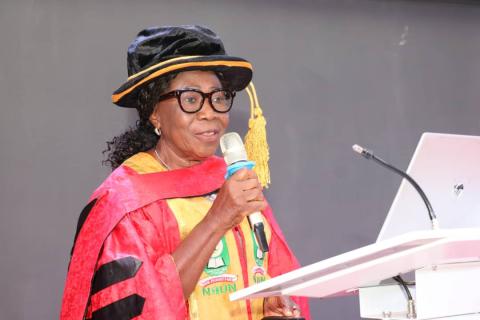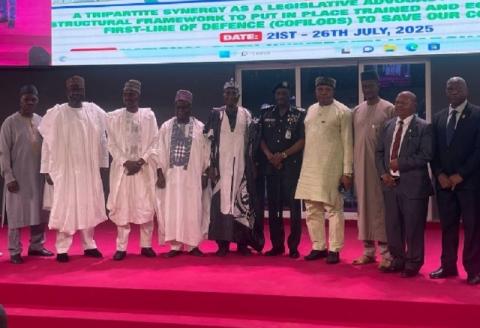NOUN VC Advocates for Robust Whistleblower Protection to Combat Corruption
Abuja, Nigeria – Professor Olufemi Peters, Vice-Chancellor of the National Open University of Nigeria (NOUN), has passionately championed the cause of enhanced whistleblower protection systems across all institutions. He emphasized that such systems are not merely prudent, but represent a critical weapon in the national arsenal against corruption.
Professor Peters' call to action came during NOUN's commemoration of the 2025 African Union Anti-Corruption Day, held at the university's headquarters. He underscored the year's theme, "Effective Whistleblower Protection Mechanisms – A Critical Tool in the Fight Against Corruption," as both timely and essential for upholding institutional integrity.
The Vice-Chancellor commended the Anti-Corruption and Transparency Unit (ACTU) for organizing the event's panel discussion. He stressed the importance of integrating academic insights with practical, real-world experiences, asserting that protecting whistleblowers demonstrates a commitment to defending truth, even in the face of personal risk.
To illustrate his point, Peters recounted a compelling documentary about a Japanese manufacturing executive who exposed internal fraud. While his actions saved lives and restored quality standards, the whistleblower tragically lost his job, family, and peace of mind. This, the VC noted, serves as a stark reminder that without robust institutional protection, those who speak truth to power often pay a devastating price.
He further explained that for whistleblowing to be effective, institutions must not only have mechanisms for receiving information but also for acting upon it decisively. "It's not just a matter of compliance," he stated, "but also a matter of wisdom."
“As a university, we must align with national and continental efforts to rid our societies of corruption," Peters declared. "‘’Through distance learning and open education, we are reshaping access, but we must also reshape values,” he added, highlighting NOUN's commitment to ethical governance.
He affirmed that NOUN-ACTU is proactively fostering a culture of openness and ethical conduct among both staff and students. "Corruption thrives in silence," he noted, "but peace and progress come from truth."
Professor Peters concluded by urging all stakeholders – staff, students, alumni, and partners – to reflect on their individual roles in strengthening whistleblower mechanisms wherever they operate.
ACTU Head Emphasizes Collective Action Against Corruption
In her welcome address, Mrs. Doris Nzenwa, Head of the ACTU, conveyed both optimism and a sense of urgency, calling the event a landmark moment for the NOUN community. She emphasized the critical need for collective action and sustained awareness in the fight against corruption.
Nzenwa highlighted the devastating impact of corruption on development, justice, and equity, noting that the diversion of public resources erodes trust and impedes progress. She stressed the importance of implementing robust preventative measures.
She described whistleblowers as the first line of defense against unethical conduct, emphasizing that without adequate safeguards, many individuals will remain silent out of fear of reprisal.
“We must ensure that structures are in place within our university, across our study centres, and throughout public service that guarantee the safety, anonymity, and rights of whistleblowers," Nzenwa stated. "To build a culture where truth-telling is not punished, but celebrated,” she added.
Nzenwa also expressed her gratitude to the NOUN management for their ongoing support of anti-corruption initiatives and welcomed the guests, panelists, and stakeholders, acknowledging their shared commitment.
The event featured goodwill messages and a panel session comprised of experts in legal reform, ethics, public administration, and campus leadership. The discussions focused on identifying actionable steps that institutions can take to institutionalize anti-corruption safeguards and promote a culture of transparency and accountability.


Share your thoughts about this post